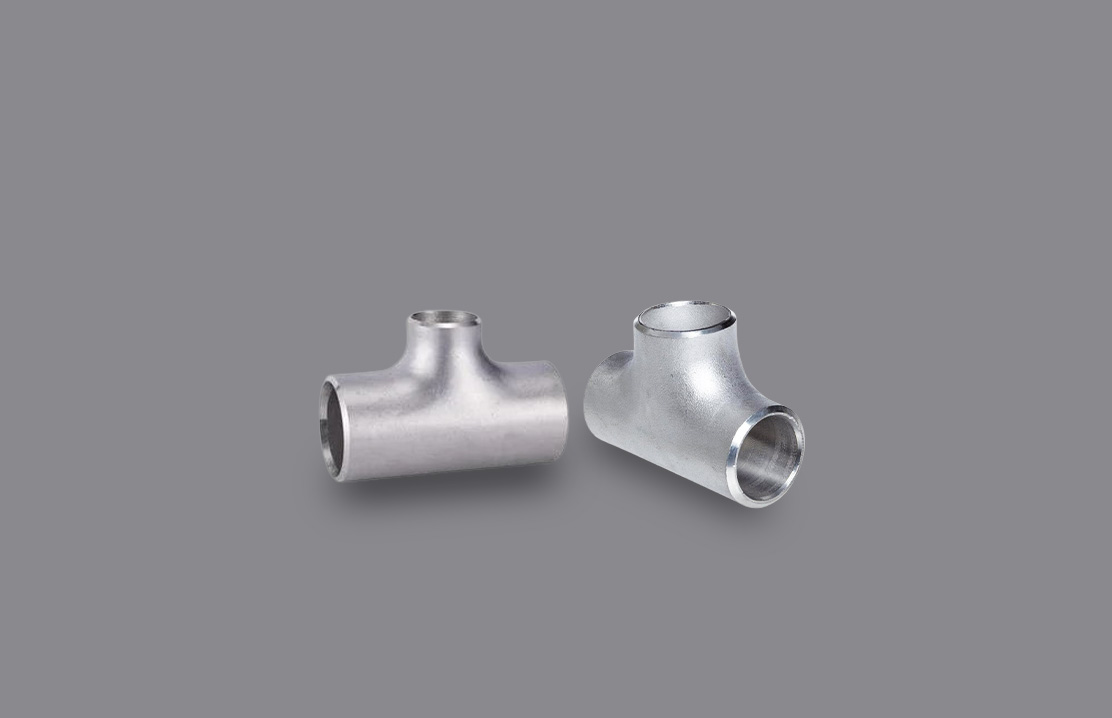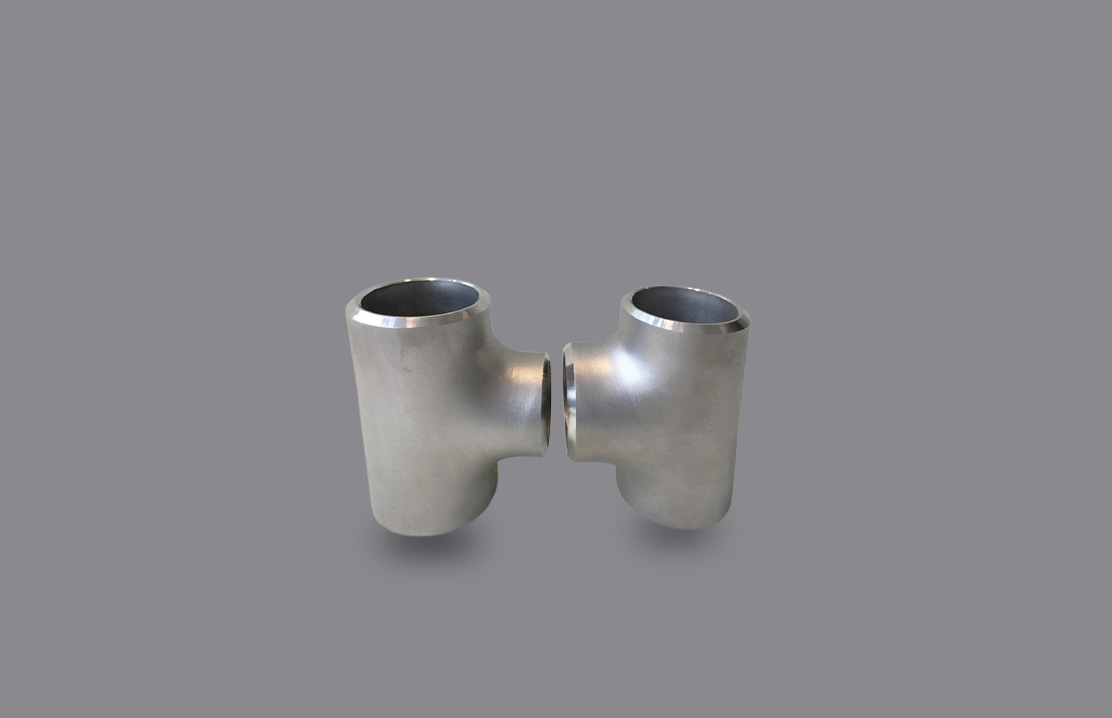Alloy Steel Equal and Unequal Tee
Home - Alloy Steel - Alloy Steel Seamless Buttweld Fittings - Alloy Steel Equal and Unequal Tee
Alloy Steel Equal and Unequal Tee
EBY Fasteners is a leading provider of high-quality ASME/ANSI Equal & Unequal Tees. These versatile fittings are essential for changing flow direction or connecting pipes of different sizes within piping systems. Ideal for both high and low-temperature use, our tees ensure reliable performance and durability. We offer a wide range of specifications, materials, shapes, and thicknesses to meet your specific project needs
Our Equal & Unequal Tee Seamless Buttweld Fittings are designed for smooth, uninterrupted flow. Available in various materials like Stainless Steel (ASTM A403 WP316/316L, ASTM A403 WP304/304L), Carbon Steel (ASTM A 234 WPB), and Alloy Steel (ASTM / ASME A/SA 234 Gr. WP 1, WP 5, WP 9…), these fittings offer exceptional corrosion resistance, strength, and toughness across different conditions


EBY Fasteners also offers Unequal Tee Forged Pipe Fittings. An unequal tee is a “T” shaped fitting where the pipes fitted as a branch out are not of equal measurements. The socket weld unequal tees can be used for smaller pipe fittings. These forged unequal tee fittings ensure consistent appearance, long life, and good mechanical properties


EBY Fasteners also offers Unequal Tee Forged Pipe Fittings. An unequal tee is a “T” shaped fitting where the pipes fitted as a branch out are not of equal measurements. The socket weld unequal tees can be used for smaller pipe fittings. These forged unequal tee fittings ensure consistent appearance, long life, and good mechanical properties
- ASTM A234 :
- WP1 & WP5 : These grades offer good general-purpose strength at moderate temperatures. You might see them in less demanding piping systems.
- WP9, WP11, & WP12 : Increasing amounts of chromium and molybdenum boost strength at higher temperatures and improve creep resistance (deformation over time under heat and pressure). These are common choices in power plants and refineries.
- WP22 & WP91 : These top-tier grades contain high chromium content, providing exceptional strength and resistance to heat and corrosion. You'd find them in the most critical, high-pressure areas of refineries or power generation facilities.
- ASTM A182 :
- F1 & F5 : Parallel their A234 counterparts, but forged fittings sometimes have a slight edge in strength.
- F9 to F91 : Again, increasing temperature capability and corrosion resistance based on alloy content. Think of these in terms of how harsh the environment is. An F22 tee has the same heat tolerance as a WP22 tee
- The Standards to Follow : Alloy steel tees aren't just randomly made! They adhere to strict standards (think ASTM A234, ASTM A182, MSS SP-43, BS 3799) to ensure they fit into your piping system flawlessly and perform as expected.
- It's All About the Material : The right alloy steel grade is essential. Common choices come from ASTM A234 and A182, each with its own strengths in terms of temperature, corrosion resistance, and overall toughness. For less demanding jobs, carbon steel might suffice. Need extreme corrosion protection? Opt for stainless steel.
- Size and Shape Matter : Tees are defined by Nominal Pipe Size (NPS), ensuring they match your pipe diameters. Remember, equal tees have the same size all around, while unequal tees have a smaller branch for changing pipe sizes. Wall thickness (the Schedule) is key for pressure handling.
- How Much Pressure Can They Take? : This depends on the material, wall thickness, and whether it's an equal or unequal tee. Common pressure ratings you'll see are 3000 PSI, 6000 PSI, or even 9000 PSI for tough applications.
- The Finishing Touches : Most tees are beveled for easy butt-welding, but other end finishes are possible. Seamless tees generally boast slightly better pressure ratings compared to welded ones. Need something non-standard? Many manufacturers can customize tees and will follow specific testing procedures for your project's safety
- Flow Management : Their fundamental purpose – controlling and directing flow within piping systems. Equal tees maintain the same flow diameter, while unequal tees reduce flow size.
- Versatility of Material : Available in a range of alloy steels (ASTM A234, A182), each with specific temperature tolerances, corrosion resistance, and strength properties to suit various applications.
- Durability and Strength : Alloy steel construction gives them the strength to withstand high pressures, temperatures, and challenging operating environments.
- Dimensional Variety : Come in various sizes (NPS) and wall thicknesses (Schedules) to accommodate different pipe dimensions and pressure requirements within a system.
- Standards Compliance : Manufactured to adhere to industry standards (ASTM, MSS SP, etc.), ensuring compatibility and reliability.
- Adaptability : Can be used in various piping systems, from those carrying simple fluids to those handling chemically aggressive or high-temperature substances.
- Customization Potential : Manufacturers may offer special materials, finishes, or dimensional variations to tailor tees for specific project requirements
- Refinery & Petrochemical : Alloy steel tees are essential in complex piping networks within refineries and petrochemical plants. They handle crude oil, refined products, and process chemicals, withstanding high temperatures, pressures, and potential corrosion.
- Chemical : Where harsh chemicals are involved, alloy steel tees are crucial. They transport acids, alkalis, and other aggressive fluids and are also used in hot process lines within chemical plants.
- Oil & Gas : Alloy steel tees connect pipelines for crude oil and gas in both onshore and offshore settings, resisting the corrosive elements often present. They also serve within refineries and processing plants.
- Power Plant : High-pressure and high-temperature steam lines in power plants rely on alloy steel tees for strength and resilience. These tees are also found in water treatment, cooling, and other systems.
- Offshore Platforms : The harsh marine environment demands alloy steel tees for their corrosion resistance. They are used in piping systems handling oil, gas, and process fluids on offshore platforms.
- Ship Building : Alloy steel tees are found in engine room systems (fuel, lubrication, cooling), ballast lines, and other marine piping, withstanding seawater corrosion and the stresses of shipboard use.
- Industrial Machineries : Alloy steel tees manage high pressures in hydraulic equipment and ensure reliable lubrication delivery within various industrial machines.
- Pharmaceuticals, Dairy & Food, Sugar Mills : Stainless steel alloy tees are mandatory for maintaining sanitary process piping in these industries, preventing contamination by resisting corrosion.
- Pumps & Compressors : Alloy steel tees are used at the inlet and outlet of pumps and compressors, where they encounter high pressures and potentially corrosive fluids.
- Textile Machineries : Alloy steel tees are used in steam systems for heating and processing, as well as in water lines and for transporting dyes or other process chemicals within textile manufacturing facilities.
- Fertilizers & Pesticides : Pipelines within fertilizer and pesticide manufacturing often rely on alloy steel tees for their resistance to the harsh chemicals involved in production and transportation
Chemical Composition
| Element | Composition |
|---|---|
| Carbon © | 0.30 |
| Manganese (Mn) | 0.29 - 1.06 |
| Phosphorus (P) | 0.05 |
| Sulfur (S) | 0.058 |
| Silicon (Si) | 0.10 min |
| Chromium (Cr) | Upto 0.40 |
| Molybdenum (Mo) | Upto 0.15 |
| Nickel (Ni) | Upto 0.40 |
| Copper (Cu) | Upto 0.40 |
| Vanadium (V) | Upto 0.08 |
| Columbium (Cb) | Upto 0.02 |






